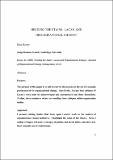| dc.contributor.author | Kenny, Kate | |
| dc.date.accessioned | 2012-04-27T10:45:25Z | |
| dc.date.available | 2012-04-27T10:45:25Z | |
| dc.date.issued | 2009-03 | |
| dc.identifier.citation | Kate Kenny, (2009) "Heeding the stains: Lacan and organizational change", Journal of Organizational Change Management, Vol. 22 Iss: 2, pp.214 - 228 | en_US |
| dc.identifier.issn | 0953-4814 | |
| dc.identifier.uri | http://hdl.handle.net/10379/2699 | |
| dc.description.abstract | Purpose - The purpose of this paper is to add to current discussions on the use of Lacanian psychoanalysis in organizational change. Specifically, It argues that critiques of Lacan's work must be acknowledged and incorporated into these discussions. To date, there remains a silence surrounding these critiques within organization studies.
Design/methodology/approach - The paper presents the existing studies that draw upon Lacan's work in the context of organizational change initiatives. It highlights the value of this theory. Next, it outlines critiques of Lacan's concepts of phallus and incest taboo, and show how these concepts can be exclusionary.
Findings - The paper finds that there remains little debate within organization studies around such critiques. Lacan tends to be employed in ways that risk reproducing particular, exclusionary aspects of his theory. A homophobic and patriarchal legacy persists in appropriations of his writing. It outlines alternative ways of reading Lacan, which aim to avoid such exclusions. It shows how introducing such alternatives is a difficult project, first, given the silence surrounding critiques of Lacan in the organizational change literature. Second, following Foucault, It argues that language has power: a patriarchal schema is self-reinforcing in its persistence within a particular discipline, and thus difficult to dislodge.
Research limitations/implications - Given these findings, the paper concludes that organization theorists and practitioners ought to engage with critiques of Lacan's work, when employing it in their own. The silence surrounding such legacies is dangerous. It argues that the first step in engaging with Lacan's work should be to give voice to such critiques, if his writing is to be employed in the practice and study of organizational change.
Originality/value - This paper provides a unique engagement with Lacan's work in the context of the study and practice of organizational change interventions. It presents an evaluation of well-known critiques and useful recommendations for theorists and practitioners considering a Lacanian approach to this area of management studies. | en_US |
| dc.format | application/pdf | en_US |
| dc.language.iso | en | en_US |
| dc.publisher | Emerald | en_US |
| dc.relation.ispartof | Journal of Organizational Change Management | en |
| dc.rights | Attribution-NonCommercial-NoDerivs 3.0 Ireland | |
| dc.rights.uri | https://creativecommons.org/licenses/by-nc-nd/3.0/ie/ | |
| dc.subject | Change management | en_US |
| dc.subject | Feminism | en_US |
| dc.subject | Organizational change | en_US |
| dc.subject | Psychology | en_US |
| dc.title | Heeding the stains: Lacan and organizational change | en_US |
| dc.type | Article | en_US |
| dc.date.updated | 2012-04-26T15:20:57Z | |
| dc.local.publishedsource | http://dx.doi.org/10.1108/09534810910947226 | en_US |
| dc.description.peer-reviewed | peer-reviewed | |
| dc.contributor.funder | |~| | |
| dc.internal.rssid | 1137833 | |
| dc.local.contact | Kate Kenny, School Of Political Science, & Sociology, Room 220, Aras Moyola, Nui Galway. 5401 Email: kate.kenny@nuigalway.ie | |
| dc.local.copyrightchecked | Yes | |
| dc.local.version | ACCEPTED | |
| nui.item.downloads | 1368 | |


